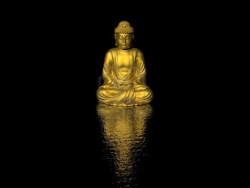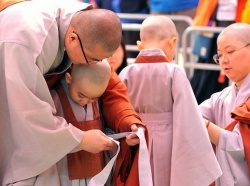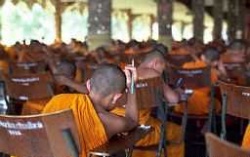Difference between revisions of "What is the Sangha?"
| Line 1: | Line 1: | ||
[[File:2822457922.jpg|thumb|250px|]] | [[File:2822457922.jpg|thumb|250px|]] | ||
To clarify, there can be some {{Wiki|confusion}} in the way the [[Sanskrit]] [[word]] [[Sangha]] is commonly used. In fact, there are three {{Wiki|distinct}} definitions: | To clarify, there can be some {{Wiki|confusion}} in the way the [[Sanskrit]] [[word]] [[Sangha]] is commonly used. In fact, there are three {{Wiki|distinct}} definitions: | ||
| − | 1. A currently popular definition is to include all [[Buddhist]] practitioners. | + | 1. A currently popular [[definition]] is to include all [[Buddhist]] practitioners. |
| − | 2. The most generally applied term includes only the community of [[ordained]] [[monks and nuns]]. | + | 2. The most generally applied term includes only the {{Wiki|community}} of [[ordained]] [[monks and nuns]]. |
| − | 3. A more strict definition from the [[scriptures]] applies to the practitioners who have at least directly realised [[emptiness]]. | + | 3. A more strict [[definition]] from the [[scriptures]] applies to the practitioners who have at least directly realised [[emptiness]]. |
[[File:2849.jpg|thumb|250px|]] | [[File:2849.jpg|thumb|250px|]] | ||
| − | During his [[life]], the [[Buddha]] gave advice to many [[people]] on ways to avoid {{Wiki|distraction}} from following the [[spiritual]] [[path]]. The [[Buddha]] never actually taught "a set" of [[vows]] for [[monks]] or [[nuns]], but these have been extracted afterwards by [[Buddhist Masters]] from the teachings of the [[Buddha]]. | + | During his [[life]], the [[Buddha]] gave advice to many [[people]] on ways to avoid {{Wiki|distraction}} from following the [[spiritual]] [[path]]. The [[Buddha]] never actually [[taught]] "a set" of [[vows]] for [[monks]] or [[nuns]], but these have been extracted afterwards by [[Buddhist Masters]] from the teachings of the [[Buddha]]. |
[[File:2866-bu.jpg|thumb|250px|]] | [[File:2866-bu.jpg|thumb|250px|]] | ||
| − | It is important to realise that [[monasteries]] and nunneries have proven to be absolutely [[essential]] in preserving the [[Buddhist teachings]] and practice. One could say that [[monasteries]] are the "[[power]] [[plants]]" of the [[Buddhist tradition]]. | + | It is important to realise that [[monasteries]] and [[nunneries]] have proven to be absolutely [[essential]] in preserving the [[Buddhist teachings]] and [[practice]]. One could say that [[monasteries]] are the "[[power]] [[plants]]" of the [[Buddhist tradition]]. |
[[File:28825-1.jpg|thumb|250px|]] | [[File:28825-1.jpg|thumb|250px|]] | ||
For [[Buddhists]], the [[Sangha]] are [[spiritual]] friends, and their importance is explained in the [[Upaddha Sutta]]. | For [[Buddhists]], the [[Sangha]] are [[spiritual]] friends, and their importance is explained in the [[Upaddha Sutta]]. | ||
| Line 13: | Line 13: | ||
:"Ven. [[Ananda]] said to the [[Blessed One]], 'This is half of the {{Wiki|holy}} [[life]], [[Lord]] - admirable [[friendship]].' The [[Buddha]] replied, 'Don't say that... Admirable [[friendship]] is actually the whole of the {{Wiki|holy}} [[life]]. When a [[monk]] [or anyone else] has admirable [[people]] as friends... he can be expected to develop and pursue the [[Noble Eightfold Path]]. … | :"Ven. [[Ananda]] said to the [[Blessed One]], 'This is half of the {{Wiki|holy}} [[life]], [[Lord]] - admirable [[friendship]].' The [[Buddha]] replied, 'Don't say that... Admirable [[friendship]] is actually the whole of the {{Wiki|holy}} [[life]]. When a [[monk]] [or anyone else] has admirable [[people]] as friends... he can be expected to develop and pursue the [[Noble Eightfold Path]]. … | ||
| − | :And through this line of {{Wiki|reasoning}} one may know how admirable [[friendship]], admirable companionship, admirable camaraderie is actually the whole of the {{Wiki|holy}} [[life]]: It is in dependence on me as an [[admirable friend]] that [[beings]] [[subject]] to [[birth]] have gained release from [[birth]], that [[beings]] [[subject]] to [[aging]] have gained release from [[aging]], that [[beings]] [[subject]] to [[death]] have gained release from [[death]], that [[beings]] [[subject]] to [[sorrow]], [[lamentation]], [[pain]], {{Wiki|distress}}, & despair have gained release from [[sorrow]], [[lamentation]], [[pain]], {{Wiki|distress}}, & despair. It is through this line of {{Wiki|reasoning}} that one may know how admirable [[friendship]], admirable companionship, admirable camaraderie is actually the whole of the {{Wiki|holy}} [[life]]." | + | :And through this line of {{Wiki|reasoning}} one may know how admirable [[friendship]], admirable companionship, admirable camaraderie is actually the whole of the {{Wiki|holy}} [[life]]: It is in [[dependence]] on me as an [[admirable friend]] that [[beings]] [[subject]] to [[birth]] have gained [[release]] from [[birth]], that [[beings]] [[subject]] to [[aging]] have gained [[release]] from [[aging]], that [[beings]] [[subject]] to [[death]] have gained [[release]] from [[death]], that [[beings]] [[subject]] to [[sorrow]], [[lamentation]], [[pain]], {{Wiki|distress}}, & {{Wiki|despair}} have gained [[release]] from [[sorrow]], [[lamentation]], [[pain]], {{Wiki|distress}}, & {{Wiki|despair}}. It is through this line of {{Wiki|reasoning}} that one may know how admirable [[friendship]], admirable companionship, admirable camaraderie is actually the whole of the {{Wiki|holy}} [[life]]." |
[[File:2feHiRes.JPG|thumb|250px|]] | [[File:2feHiRes.JPG|thumb|250px|]] | ||
== SOME GENERAL NOTES ON ORDINATION == | == SOME GENERAL NOTES ON ORDINATION == | ||
| Line 22: | Line 22: | ||
A few hints that I found useful to understand {{Wiki|being}} a [[Buddhist monk]] or [[nun]]: | A few hints that I found useful to understand {{Wiki|being}} a [[Buddhist monk]] or [[nun]]: | ||
| − | * To be a [[Buddhist]], one does not need to be [[ordained]] as [[monk]] or [[nun]]. Even to become a [[Buddha]], [[ordination]] is strictly spoken not necessary - although it may be very [[wise]] to avoid the distractions of a lay person's [[life]]. | + | * To be a [[Buddhist]], one does not need to be [[ordained]] as [[monk]] or [[nun]]. Even to become a [[Buddha]], [[ordination]] is strictly spoken not necessary - although it may be very [[wise]] to avoid the {{Wiki|distractions}} of a lay person's [[life]]. |
* To become a [[monk]] or [[nun]], one should at least have taken [[refuge]]. Next, with a limited number of [[vows]] (always including [[celibacy]]) one can become a [[novice]]. Later, by committing oneself to a very extensive set of [[vows]], one can become a fully [[ordained]] [[monk]] or [[nun]]. | * To become a [[monk]] or [[nun]], one should at least have taken [[refuge]]. Next, with a limited number of [[vows]] (always including [[celibacy]]) one can become a [[novice]]. Later, by committing oneself to a very extensive set of [[vows]], one can become a fully [[ordained]] [[monk]] or [[nun]]. | ||
| − | * A [[monk]] or [[nun]] is usually not a fully [[enlightened being]]. One should consider this when judging them (a bad [[habit]] to begin with). Like everyone of {{Wiki|us}}, they are usually only trying their best at living a [[spiritual]] [[life]] and they have as important task to keep their [[vows]], which is often not easy; criticising them is easy, but usually not helpful to anyone. | + | * A [[monk]] or [[nun]] is usually not a fully [[enlightened being]]. One should consider this when judging them (a bad [[habit]] to begin with). Like everyone of {{Wiki|us}}, they are usually only trying their best at living a [[spiritual]] [[life]] and they have as important task to keep their [[vows]], which is often not easy; [[criticising]] them is easy, but usually not helpful to anyone. |
* In {{Wiki|general}}, all [[traditions]] use the same sets of [[vows]]. [[Celibacy]] (no {{Wiki|sex}}) is always part of the [[monks and nuns]] ([[novice]]) [[vows]]. In [[traditions]] where [[celibacy]] is not included in the [[vows]], one can question their origin. It can still be a set of [[vows]] that is worthwhile keeping, but one is not a [[Buddhist monk]] or [[nun]]. | * In {{Wiki|general}}, all [[traditions]] use the same sets of [[vows]]. [[Celibacy]] (no {{Wiki|sex}}) is always part of the [[monks and nuns]] ([[novice]]) [[vows]]. In [[traditions]] where [[celibacy]] is not included in the [[vows]], one can question their origin. It can still be a set of [[vows]] that is worthwhile keeping, but one is not a [[Buddhist monk]] or [[nun]]. | ||
* Depending on the [[tradition]], the [[vows]] are taken for [[life]] or any shorter period. For example, in [[Thailand]] it is [[tradition]] that virtually all men become novices and [[live]] at a [[monastery]] at least for a short period during their youth. In contrast, in the [[Tibetan tradition]], taking [[monks]] or [[nuns]] [[vows]] is basically for [[life]], although the [[vows]] can be given back if one [[feels]] one cannot keep them. | * Depending on the [[tradition]], the [[vows]] are taken for [[life]] or any shorter period. For example, in [[Thailand]] it is [[tradition]] that virtually all men become novices and [[live]] at a [[monastery]] at least for a short period during their youth. In contrast, in the [[Tibetan tradition]], taking [[monks]] or [[nuns]] [[vows]] is basically for [[life]], although the [[vows]] can be given back if one [[feels]] one cannot keep them. | ||
* It is considered important to try and receive teachings about the [[vows]] before and after {{Wiki|being}} [[ordained]]. | * It is considered important to try and receive teachings about the [[vows]] before and after {{Wiki|being}} [[ordained]]. | ||
* For [[people]] wanting to be [[ordained]] by [[His Holiness]] the [[Dalai Lama]] himself, often a special possibility [[exists]] after his [[Losar]] teachings (usually end of February) in {{Wiki|Dharamsala}}, [[India]]. | * For [[people]] wanting to be [[ordained]] by [[His Holiness]] the [[Dalai Lama]] himself, often a special possibility [[exists]] after his [[Losar]] teachings (usually end of February) in {{Wiki|Dharamsala}}, [[India]]. | ||
| − | * It may be confusing at times, but not everyone who appears to wear [[robes]] may be a [[monk]] or [[nun]]. For example, there is a [[Tibetan tradition]] of (often long-haired) [[tantric]] practitioners (Ngagpa's) who are not [[ordained]], although they wear similar [[robes]] and have taken many [[vows]]. Also, at some [[monasteries]], [[lay people]] can stay and wear similar (though not identical) [[robes]]. | + | * It may be confusing at times, but not everyone who appears to wear [[robes]] may be a [[monk]] or [[nun]]. For example, there is a [[Tibetan tradition]] of (often long-haired) [[tantric]] practitioners (Ngagpa's) who are not [[ordained]], although they wear similar [[robes]] and have taken many [[vows]]. Also, at some [[monasteries]], [[lay people]] can stay and wear similar (though not [[identical]]) [[robes]]. |
* Why becoming a [[monk]] or [[nun]]? [[Lama Zopa Rinpoche]] can answer that better than I ever could. | * Why becoming a [[monk]] or [[nun]]? [[Lama Zopa Rinpoche]] can answer that better than I ever could. | ||
* This website on [[Thailand]] gives an eleborate description of the [[traditional]] [[Thai]] [[ordination]] procedure. | * This website on [[Thailand]] gives an eleborate description of the [[traditional]] [[Thai]] [[ordination]] procedure. | ||
| − | == THE WELFARE OF THE SANGHA == | + | == THE WELFARE OF THE [[SANGHA]] == |
| − | In the 'Mahiparinirvana [[Sutra]]', [[Shakyamuni Buddha]] gave a number of [[conditions]] the [[Sangha]] should fulfil to ensure the welfare and growth of the [[Sangha]], which I tried to summarise below. | + | In the 'Mahiparinirvana [[Sutra]]', [[Shakyamuni Buddha]] gave a number of [[conditions]] the [[Sangha]] should fulfil to ensure the {{Wiki|welfare}} and growth of the [[Sangha]], which I tried to summarise below. |
=== Seven [[conditions]] === | === Seven [[conditions]] === | ||
* Assemble frequently and in large numbers | * Assemble frequently and in large numbers | ||
| − | *Meet and disperse peacefully and attend to the affairs of the [[Sangha]] in [[concord]] - Appoint no new rules, and do not abolish the [[existing]] ones, but proceed in accordance with the code of training ([[Vinaya]]) laid down | + | *Meet and disperse peacefully and attend to the affairs of the [[Sangha]] in [[concord]] - Appoint no new {{Wiki|rules}}, and do not abolish the [[existing]] ones, but proceed in accordance with the code of {{Wiki|training}} ([[Vinaya]]) laid down |
* Show [[respect]], honour, esteem, and [[veneration]] towards the elder [[Bhikkhus]], those of long [[standing]], long gone forth, the fathers and leaders of the [[Sangha]], and think it worthwhile to listen to them | * Show [[respect]], honour, esteem, and [[veneration]] towards the elder [[Bhikkhus]], those of long [[standing]], long gone forth, the fathers and leaders of the [[Sangha]], and think it worthwhile to listen to them | ||
* Do not come under the [[power]] of the [[craving]] that leads to fresh becoming | * Do not come under the [[power]] of the [[craving]] that leads to fresh becoming | ||
| Line 60: | Line 60: | ||
* Have [[faith]] | * Have [[faith]] | ||
* Have [[moral]] [[shame]] | * Have [[moral]] [[shame]] | ||
| − | * Have {{Wiki|fear}} of misconduct | + | * Have {{Wiki|fear}} of {{Wiki|misconduct}} |
| − | * Be proficient in {{Wiki|learning}} | + | * Be {{Wiki|proficient}} in {{Wiki|learning}} |
* Be resolute | * Be resolute | ||
* Be [[mindful]] | * Be [[mindful]] | ||
| Line 80: | Line 80: | ||
* Cultivate the [[perception]] of [[impermanence]] | * Cultivate the [[perception]] of [[impermanence]] | ||
* Cultivate the [[perception]] of [[egolessness]] | * Cultivate the [[perception]] of [[egolessness]] | ||
| − | * Cultivate the [[perception]] of (the body's) [[impurity]] | + | * Cultivate the [[perception]] of (the [[body's]]) [[impurity]] |
| − | * Cultivate the [[perception]] of (the body's) wretchedness | + | * Cultivate the [[perception]] of (the [[body's]]) wretchedness |
| − | * Cultivate the [[perception]] of relinquishment | + | * Cultivate the [[perception]] of [[relinquishment]] |
| − | * Cultivate the [[perception]] of dispassion | + | * Cultivate the [[perception]] of [[dispassion]] |
* Cultivate the [[perception]] of [[cessation]]. | * Cultivate the [[perception]] of [[cessation]]. | ||
| Line 91: | Line 91: | ||
* Attend on each other with [[loving-kindness]] in [[word]], both openly and in private | * Attend on each other with [[loving-kindness]] in [[word]], both openly and in private | ||
* Attend on each other with [[loving-kindness]] in [[thought]], both openly and in private | * Attend on each other with [[loving-kindness]] in [[thought]], both openly and in private | ||
| − | * [[Respect]] of what is received as due [[offerings]], even the contents of their [[alms bowls]], not make use of them without sharing them with [[virtuous]] members of the community | + | * [[Respect]] of what is received as due [[offerings]], even the contents of their [[alms bowls]], not make use of them without sharing them with [[virtuous]] members of the {{Wiki|community}} |
| − | * In company with their brethren, they train themselves, openly and in private, in the rules of conduct, which are complete and perfect, spotless and [[pure]], liberating, praised by the [[wise]], uninfluenced (by [[mundane]] concerns), and [[favourable]] to [[concentration]] of [[mind]] | + | * In company with their brethren, they train themselves, openly and in private, in the {{Wiki|rules}} of conduct, which are complete and {{Wiki|perfect}}, spotless and [[pure]], liberating, praised by the [[wise]], uninfluenced (by [[mundane]] concerns), and [[favourable]] to [[concentration]] of [[mind]] |
* In company with their brethren preserve, openly and in private, the [[insight]] that is [[noble]] and liberating, and leads one who acts upon it to the utter destruction of [[suffering]]. | * In company with their brethren preserve, openly and in private, the [[insight]] that is [[noble]] and liberating, and leads one who acts upon it to the utter destruction of [[suffering]]. | ||
Latest revision as of 19:08, 8 March 2015
To clarify, there can be some confusion in the way the Sanskrit word Sangha is commonly used. In fact, there are three distinct definitions: 1. A currently popular definition is to include all Buddhist practitioners. 2. The most generally applied term includes only the community of ordained monks and nuns. 3. A more strict definition from the scriptures applies to the practitioners who have at least directly realised emptiness.
During his life, the Buddha gave advice to many people on ways to avoid distraction from following the spiritual path. The Buddha never actually taught "a set" of vows for monks or nuns, but these have been extracted afterwards by Buddhist Masters from the teachings of the Buddha.
It is important to realise that monasteries and nunneries have proven to be absolutely essential in preserving the Buddhist teachings and practice. One could say that monasteries are the "power plants" of the Buddhist tradition.
For Buddhists, the Sangha are spiritual friends, and their importance is explained in the Upaddha Sutta.
- "Ven. Ananda said to the Blessed One, 'This is half of the holy life, Lord - admirable friendship.' The Buddha replied, 'Don't say that... Admirable friendship is actually the whole of the holy life. When a monk [or anyone else] has admirable people as friends... he can be expected to develop and pursue the Noble Eightfold Path. …
- And through this line of reasoning one may know how admirable friendship, admirable companionship, admirable camaraderie is actually the whole of the holy life: It is in dependence on me as an admirable friend that beings subject to birth have gained release from birth, that beings subject to aging have gained release from aging, that beings subject to death have gained release from death, that beings subject to sorrow, lamentation, pain, distress, & despair have gained release from sorrow, lamentation, pain, distress, & despair. It is through this line of reasoning that one may know how admirable friendship, admirable companionship, admirable camaraderie is actually the whole of the holy life."
SOME GENERAL NOTES ON ORDINATION
Monks and nuns are revolutionaries. They cherish a great aspiration in their hearts, and that is how they have the strength to cut the net of worldly attachments. They go forth from family life to enter the path of the Buddha, and they aspire to love and help everyone, not just one person. Monks and nuns cherish their freedom so they can be a source of happiness for many people. Seeing how much entanglement and suffering there is in this world, they feel compassion and want to help people who are suffering. Thich Nhat Hanh from 'Stepping Into Freedom'
A few hints that I found useful to understand being a Buddhist monk or nun:
- To be a Buddhist, one does not need to be ordained as monk or nun. Even to become a Buddha, ordination is strictly spoken not necessary - although it may be very wise to avoid the distractions of a lay person's life.
- To become a monk or nun, one should at least have taken refuge. Next, with a limited number of vows (always including celibacy) one can become a novice. Later, by committing oneself to a very extensive set of vows, one can become a fully ordained monk or nun.
- A monk or nun is usually not a fully enlightened being. One should consider this when judging them (a bad habit to begin with). Like everyone of us, they are usually only trying their best at living a spiritual life and they have as important task to keep their vows, which is often not easy; criticising them is easy, but usually not helpful to anyone.
- In general, all traditions use the same sets of vows. Celibacy (no sex) is always part of the monks and nuns (novice) vows. In traditions where celibacy is not included in the vows, one can question their origin. It can still be a set of vows that is worthwhile keeping, but one is not a Buddhist monk or nun.
- Depending on the tradition, the vows are taken for life or any shorter period. For example, in Thailand it is tradition that virtually all men become novices and live at a monastery at least for a short period during their youth. In contrast, in the Tibetan tradition, taking monks or nuns vows is basically for life, although the vows can be given back if one feels one cannot keep them.
- It is considered important to try and receive teachings about the vows before and after being ordained.
- For people wanting to be ordained by His Holiness the Dalai Lama himself, often a special possibility exists after his Losar teachings (usually end of February) in Dharamsala, India.
- It may be confusing at times, but not everyone who appears to wear robes may be a monk or nun. For example, there is a Tibetan tradition of (often long-haired) tantric practitioners (Ngagpa's) who are not ordained, although they wear similar robes and have taken many vows. Also, at some monasteries, lay people can stay and wear similar (though not identical) robes.
- Why becoming a monk or nun? Lama Zopa Rinpoche can answer that better than I ever could.
- This website on Thailand gives an eleborate description of the traditional Thai ordination procedure.
THE WELFARE OF THE SANGHA
In the 'Mahiparinirvana Sutra', Shakyamuni Buddha gave a number of conditions the Sangha should fulfil to ensure the welfare and growth of the Sangha, which I tried to summarise below.
Seven conditions
- Assemble frequently and in large numbers
- Meet and disperse peacefully and attend to the affairs of the Sangha in concord - Appoint no new rules, and do not abolish the existing ones, but proceed in accordance with the code of training (Vinaya) laid down
- Show respect, honour, esteem, and veneration towards the elder Bhikkhus, those of long standing, long gone forth, the fathers and leaders of the Sangha, and think it worthwhile to listen to them
- Do not come under the power of the craving that leads to fresh becoming
- Cherish the forest depths for their dwellings
- Establish themselves in mindfulness, so that virtuous brethren of the Order who have not come yet might do so, and those already come might live in peace
Seven further conditions
- Do not delight in, be not pleased with, or be not fond of: activities
- Do not delight in, be not pleased with, and not fond of talk
- Do not delight in, be not pleased with, and not fond of sleep
- Do not delight in, be not pleased with, and not fond of company
- Do not have bad friends, associates, or companions
- Do not harbour and do not come under the spell of evil desires
- Do not stop halfway on account of some trifling achievement.
Seven Good Qualities
- Have faith
- Have moral shame
- Have fear of misconduct
- Be proficient in learning
- Be resolute
- Be mindful
- Be wise
Seven factors of enlightenment
- Cultivate mindfulness
- Investigate into phenomena
- Investigate and cultivate energy
- Investigate and cultivate bliss
- Investigate and cultivate tranquillity
- Investigate and cultivate concentration
- Investigate and cultivate equanimity.
Seven further conditions
- Cultivate the perception of impermanence
- Cultivate the perception of egolessness
- Cultivate the perception of (the body's) impurity
- Cultivate the perception of (the body's) wretchedness
- Cultivate the perception of relinquishment
- Cultivate the perception of dispassion
- Cultivate the perception of cessation.
Six Conditions to be Remembered
- Attend on each other with loving-kindness in deed, both openly and in private
- Attend on each other with loving-kindness in word, both openly and in private
- Attend on each other with loving-kindness in thought, both openly and in private
- Respect of what is received as due offerings, even the contents of their alms bowls, not make use of them without sharing them with virtuous members of the community
- In company with their brethren, they train themselves, openly and in private, in the rules of conduct, which are complete and perfect, spotless and pure, liberating, praised by the wise, uninfluenced (by mundane concerns), and favourable to concentration of mind
- In company with their brethren preserve, openly and in private, the insight that is noble and liberating, and leads one who acts upon it to the utter destruction of suffering.







